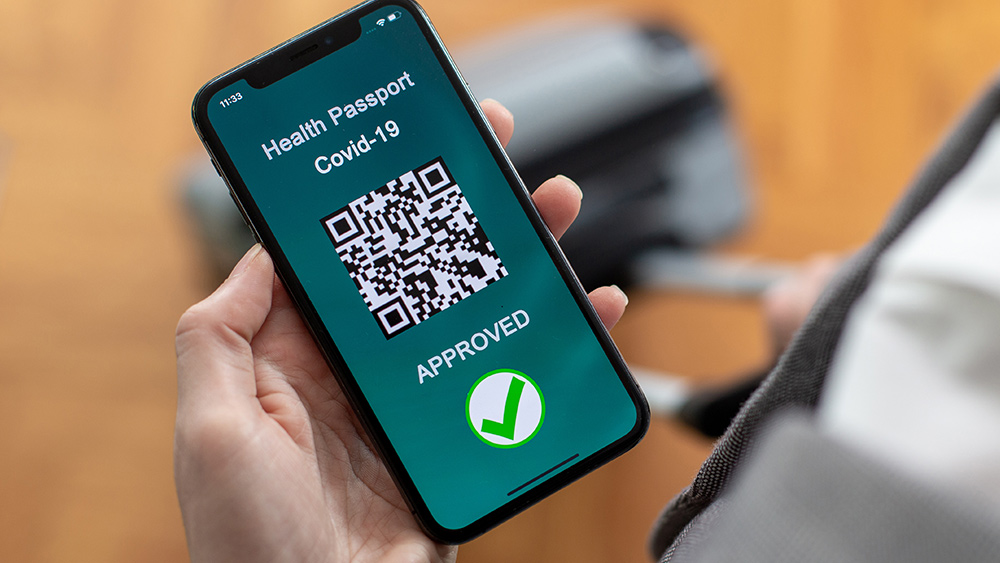Trump DOJ obtained data on Schiff and Swalwell, two long-time champions of domestic spying
07/05/2021 / By News Editors

The Trump Justice Department in 2017 and early 2018 issued subpoenas to Apple to obtain the communications records of at least two Democratic members of the House Intelligence Committee, Reps. Adam Schiff (D-CA) and Eric Swalwell (D-CA). According to The New York Times, DOJ prosecutors attempting to determine who leaked classified information to the media about Russiagate suspected the two House Democrats were the culprits, and to prove that, they obtained their communications records as well as those of family members, including minor children.
(Article by Glenn Greenwald republished from Greenwald.Substack.com)
A DOJ leak investigation aimed at sitting members of Congress is highly unusual. Both the Obama and Trump administrations, in a hunt for leakers, created controversy by obtaining the communications records of journalists, including — in the case of the Obama DOJ — the family members of those journalists. But investigating members of the House Intelligence Committee for leaking crimes — as opposed to corruption or other standard criminal charges — can present different dangers. Neither Congressman was charged with any crimes and the investigation reportedly bore no fruit.
The two House Democrats, among the most fanatical disseminators of baseless Russiagate conspiracies and long known to serve as anonymous sources of leaks to liberal media outlets, reacted with predictable outrage. “This baseless investigation, while now closed, is yet another example of Trump’s corrupt weaponization of justice,” Schiff intoned on Thursday night. As difficult as it is, Swalwell, as he often does, found a way to be even more melodramatic than Schiff: “Like many of the world’s most despicable dictators, former President Trump showed an utter disdain for our democracy and the rule of law.”
Investigating possible crimes — such as leaking classified information — is the job of the Justice Department. To accomplish that, FBI agents and prosecutors often obtain personal communications records about their suspects. But invading the communications records of journalists, as both the Obama and Trump DOJ did, can create serious threats to press freedom and the possibility of abuse and retaliation. The same is true for invading the communications records of members of the legislative branch, particularly ones hostile to the president. An investigation is certainly warranted to determine the propriety of these subpoenas.
But like so many politicians before them, Schiff and Swalwell have zero credibility to object to this targeting. When it comes to ordinary Americans, both have been long-time champions of expanding domestic spying powers and blocking efforts at reform designed to curb abuses of the type they claim took place here.
From the start of the Trump administration, Schiff and Swalwell were among the lawmakers most shrilly depicting Trump as some sort of Nazi-like figure bent on fascistic control of the United States. Yet their actions were sharply at odds with that cable-friendly rhetoric, as they repeatedly voted to preserve and expand the military budget, war powers and spying authorities of the New Hitler.
Perhaps the most relevant example was a 2018 amendment introduced by then-Rep. Justin Amash (R-MI), the long-time privacy advocate who had repeatedly sought to rein in the U.S. Government’s domestic spying powers and impose safeguards as a way to curb abuses. Amash’s amendment was part of a bill to reauthorize Section 702 of the Foreign Intelligence Surveillance Act (FISA), which allows the NSA to spy on the communications of American citizens without a warrant as long as it can claim that their target is a foreign nation and that they only “incidentally” listened in on the calls or read the emails of citizens.
That 2008 law was enacted with bipartisan support to retroactively legalize the clearly illegal Bush/Cheney program of warrantless domestic surveillance. That law also authorizes the FBI to search NSA-collected communications of Americans without a warrant for use in its criminal investigations.
Amash’s 2018 amendment was designed to prevent those abuses and rein in the power of the Executive Branch to spy on Americans. Its key provision was that it “required federal law enforcement agents [including those with the DOJ/FBI] to get a warrant before searching NSA data for information on Americans.”
It appeared that Amash had secured enough GOP votes to ensure passage of his reform bill. Fifty-seven House Republicans — part of the anti-spying wing of that party — announced their intention to support Amash’s bill. Had the 193-member House Democratic caucus delivered its votes for Amash’s amendment, it would have passed, and the U.S. Government’s spying powers could have finally been reined in, with meaningful safeguards imposed.
Instead, then-House Minority Leader Nancy Pelosi announced her opposition to Amash’s amendment. She then convinced just enough of her caucus — fifty-five members — to join with the GOP majority to defeat Amash’s bill. Among those who joined with Pelosi and the pro-spying wing of the GOP led by then-House Speaker Paul Ryan (R-WI) were Adam Schiff and Eric Swalwell. In other words, while they were basking in the adoration of MSNBC and CNN hosts for calling Trump a dictator, they were joining with Pelosi and the GOP Speaker of the House, Paul Ryan, to ensure that no limits were imposed on Trump’s powers of domestic spying.

Had Schiff and Swalwell been concerned at all with the privacy rights of ordinary citizens, they would have joined with the majority of Democrats in supporting Amash’s bill. They sided with the U.S. security state (and the Trump White House) against the rights of ordinary Americans. When reporting on this repellent act, I wrote under the headline: “The Same Democrats Who Denounce Donald Trump as a Lawless, Treasonous Authoritarian Just Voted to Give Him Vast Warrantless Spying Powers.”
So stunningly craven was this vote from Pelosi, Schiff and Swalwell that they were denounced even by the ACLU, which, during the Trump years, rarely criticized Democrats. Though not calling them out by name, the group clearly referred to them and others when expressing indignation about how the same Democrats who claimed to find Trump so dangerous just ensured the defeat of a bill that would have limited his powers, along with those of future Presidents, to abuse the government’s spying powers against U.S. citizens.

The privacy group Electronic Frontiers Foundation described the bill that ultimately passed this way: “the House just approved the disastrous NSA surveillance extension bill that will allow for continued, unconstitutional surveillance that hurts the American people and violates our Fourth Amendment rights.” Meanwhile, Rep. Ro Khanna (D-CA) praised the Republicans who voted to rein in spying powers even under Trump — an effort that would have succeeded if not for the pro-surveillance treachery of Pelosi, Schiff and Swalwell — and pointedly asked:
When @justinamash & @VoteMeadows, chair of the freedom caucus, vote against surveillance, but scores of Democrats vote for it, then its fair to ask what does our party stand for? If we can’t be unified around the principle of civil liberties, then what is the soul of our party?
— Ro Khanna (@RoKhanna) January 11, 2018
Thus do we have Schiff and Swalwell joining the ranks of a shameful club: politicians — usually California Democrats — who cheer for and empower the spying state when they think it will be used only against ordinary Americans, but not important and upstanding figures such as themselves. They then become indignant when they learn that they themselves were targeted with the spying powers they enabled.
In 2009, another long-time pro-surveillance California House Democrat, Rep. Jane Harman, learned that her private communications with an Israeli government agent had been intercepted by NSA wiretaps as she was plotting to pressure the DOJ to reduce the criminal charges against two AIPAC officials. She was absolutely furious to learn of this, telling MSNBC‘s Andrea Mitchell:
I call it an abuse of power…. I’m just very disappointed that my country — I’m an American citizen just like you are — could have permitted what I think is a gross abuse of power in recent years. I’m one member of Congress who may be caught up in it, and I have a bully pulpit and I can fight back. I’m thinking about others who have no bully pulpit, who may not be aware, as I was not, that someone is listening in on their conversations, and they’re innocent Americans.
What Harman forgot to mention during her angry rant was that she had spent years — as the ranking Democrat on the House Intelligence Committee and Homeland Security subcommittee — doing everything possible to defend, justify and expand the powers of the U.S. security state to spy on ordinary Americans. Like Schiff and Swalwell, she was delighted to see ordinary serfs spied on by their own government, and discovered her passion for privacy rights only when it was her conversations that were monitored.
Exactly the same thing happened with Sen. Dianne Feinstein, yet another California Democrat who has long been one of the most stalwart defenders of the NSA and CIA. Feinstein, whose oligarchical husband made tens of millions as a military contractor, spent years as one of the security state’s most loyal allies. She has been at the center of virtually every increase in NSA spying powers over the last several decades. Even in the wake of the Snowden reporting, she was fighting to preserve and even increase NSA domestic spying powers, vowing to block any reform efforts.
Yet in 2014, Feinstein learned that the CIA under then-Director John Brennen was spying on her and her Committee as it investigated the CIA’s interrogation programs. And, like Harman before her and Schiff and Swalwell now, she was furious about it, demanding an investigation and warning: “this is plainly an attempt to intimidate these staff and I am not taking it lightly.” As Snowden himself put it at the time after expressing concerns over the Brennan-led CIA’s spying on the Senate:
It’s equally if not more concerning that we’re seeing another “Merkel Effect,” where an elected official does not care at all that the rights of millions of ordinary citizens are violated by our spies, but suddenly it’s a scandal when a politician finds out the same thing happens to them.
And, needless to say, Feinstein, Schiff and Harman were all leading voices in maligning and demanding the prosecution of Snowden for blowing the whistle on the domestic spying abuses they supported against ordinary Americans. These political elites view revelations of illegal spying on ordinary Americans as a crime, but revelations of spying on themselves as a noble journalistic act that require immediate investigations and mass outrage.

There are few attributes more contemptible in a politician than placing themselves above the citizenry they are supposed to be serving, believing that they themselves should be immune and protected from the burdens they impose on ordinary Americans. That this DOJ investigation of Schiff and Swalwell was baseless or abusive may turn out to be correct: time will tell.
But few people have less credibility to express indignation over such spying abuses than these two House members. After playing such a vital role in ensuring that ordinary citizens are vulnerable to these vast and unrestrained surveillance systems, they now want everyone to denounce those same powers since they are the purported victims this time rather than the perpetrators.
Update, June 11, 2021, 12:12 p.m. ET: I neglected to include one of the most relevant examples. In 2019, Schiff, as part of his investigation into Trump’s involvement in Ukraine, subpoenaed the telephone records of various Trump allies and then publicly released them, in the process revealing communications activities of fellow members of Congress and journalists:
Fanatics can justify any action, and House Intelligence Chairman Adam Schiff this week demonstrated where that mindset leads. In his rush to paint Donald Trump as a lawbreaker, Mr. Schiff has himself trampled law and responsibility.
That’s the bottom line in Mr. Schiff’s stunning decision to subpoena the phone records of Rudy Giuliani and others. Mr. Schiff divulged the phone logs this week in his Ukraine report, thereby revealing details about the communications of Trump attorneys Jay Sekulow and Mr. Giuliani, ranking Intelligence Committee member Devin Nunes, reporter John Solomon and others. The media is treating this as a victory, when it is a disgraceful breach of ethical and legal propriety.
Check to see how many people expressing indignation today over the Trump DOJ’s acquisition of these records on Schiff and Swalwell expressed even a whiff of concern about that, and there you will see the difference between genuine defenders of privacy and those (like Schiff and Swalwell) who feign indignation only when they themselves are targeted.
Read more at: Greenwald.Substack.com and PrivacyWatch.news.
Tagged Under: Adam Schiff, big government, conspiracy, corruption, democrats, DOJ, domestic spying, Donald Trump, Eric Swalwell, national security, privacy watch, surveillance, traitors
RECENT NEWS & ARTICLES
COPYRIGHT © 2017 PRIVACY WATCH NEWS




















